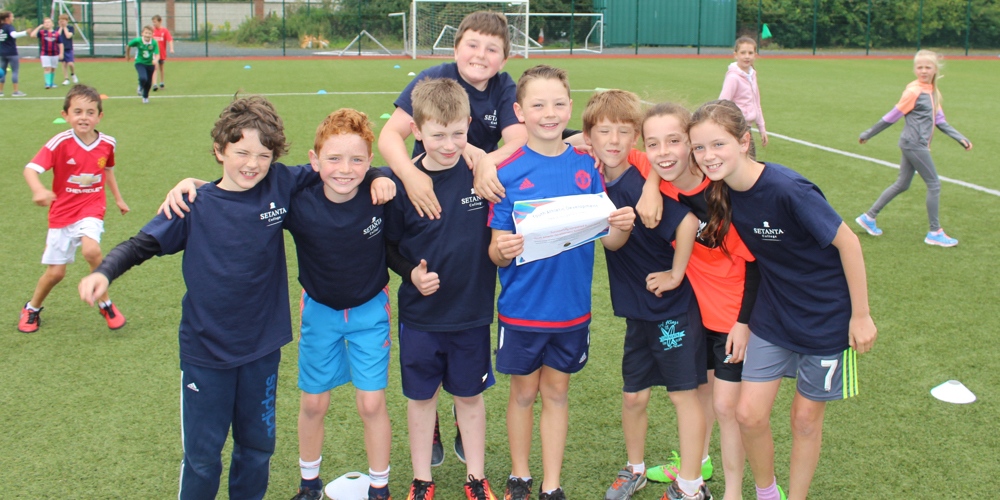During the months of July and August 2016, Setanta College, in partnership with McDonalds Limerick, ran three Youth Athletic Development camps for children between the ages of 4 and 12 in Tipperary and Limerick. The camps were the first of their kind in Ireland aimed specifically at building the fundamental movement skills of participants in a fun and challenging environment.
Children are becoming less active
Children’s physical activity levels have been in decline for a number of years, due to our modern inactive lifestyle and the emergence of screen activities such as T.V., games consoles, iPads and mobile phones. The link to physical activity levels and the risk of a number of health issues such as diabetes, stroke, obesity cardiovascular disease and mental health problems is well documented. This is even more worrying as currently 1 in 4 primary school children classified as overweight, with the trend suggesting it will soon be 1 in 3.
Fundamental Movement Skills explained
So what are Fundamental Movement Skills? Think of them as the building blocks to more complex movement patterns. The mastery of these skills among children and adolescents is an important contributor to successful and continuing participation in sport and other physical activity. This understanding has led to a systematic approach to child physical activity based on the concept of Fundamental Movement Skills (FMS). FMS are considered to be the foundation skills that lead to specialized movement sequences required for participation in many organized and non-organized physical activities for children and adolescents. Gallahue and Donnelly (2003) define a FMS as “an organized series of basic movements that involve the combination of movement patterns of two or more body segments.” These movements are commonly categorized as locomotor skills (e.g. running, jumping, and hopping) stability skills (e.g. static or dynamic) and manipulative skills (e.g. catching, throwing, and kicking).
The literature clearly demonstrates the importance of FMS and the negative aspects of low FMS. Early intervention may be vital in addressing these issues as the fundamental movement phase typically begins between 2-7 years of age (Haibach et al., 2011).
Helping children develop to the best of their abilities
The development of Rudimentary and Fundamental movement skills at this key phase in a child’s development may accentuate the child’s natural sporting attributes and allow them to develop to the best of their abilities. More importantly, being proficient in FMS has been linked to living a more active and healthy lifestyle during adulthood due to higher participation rates. Katartizi & Vlachopoulos (2011) concluded that: “Lower levels of perceived competence and frequent experience of failure leads to lower levels of participation as children feel they are not capable of performing at the standard deemed to be socially expected by their peers. This lack of participation limits the opportunities to practice their motor skills which in turn put them further behind their peers.”
What to expect from Setanta College’s Youth Athletic Development Camps
Setanta’s Youth Athletic Development Camps aimed to bridge this gap in FMS for each individual child, regardless of ability or sporting background. Simple non-evasive screening allowed for appropriate and targeted fundamental movement programming through a mixture of fun games, structured fundamental movement practice and sport specific skills.
All the coaches were graduates or existing students of Limerick Institute of Technology and Setanta College’s BSc in Strength and Conditioning. During the first day of each camp the children’s Fundamental Movement Skills were assessed and through expert coaching under the guidance of Head Coach Tom Dorney those skills were coached and improved as the week progressed. All the children thoroughly enjoyed the week and feedback from the partner sporting clubs and parents was really positive.
The camps were hosted in partnership with Thurles Crokes Athletics club, Aisling Annacotty AFC (Limerick) and Garryowen Rugby Club (Limerick). In total 200 children attended the camps, 30 in Thurles, 100 in Annacotty and 70 in Garryowen. The success of the camps has given encouragement to the College and coaches to further develop their offerings, with the possibility of Halloween, Easter and Summer camps in more locations aswell as more focused programmes for participants in the 12 to 16 age bracket to include aspects such as performance, athlete education, maturation development and conditioning.
Interested in finding out more?
If your child is interested in attending one of our future Youth Athletic Development camps, please get in touch with us via our online contact form, and we’ll let you know when and where the next events will be held.








Leave A Comment